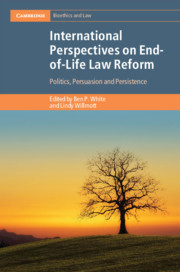Book contents
- International Perspectives on End-of-Life Law Reform
- Cambridge Bioethics and Law
- International Perspectives on End-of-Life Law Reform
- Copyright page
- Contents
- Preface
- About the Editors
- List of Contributors
- Table of Cases
- Table of Statutes, Bills and Regulations
- 1 End-of-Life Law Reform
- 2 The Path from Rodriguez to Bill C-14 and Beyond
- 3 The Extension of the Belgian Euthanasia Law to Minors in 2014
- 4 The Role of Scientific Evaluations of the Dutch Termination of Life on Request and Assisted Suicide (Review Procedure) Act
- 5 The Challenging Path to Voluntary Assisted Dying Law Reform in Australia
- 6 Should Assisted Dying Require the Consent of a High Court Judge?
- 7 Aid in Dying in the United States
- 8 The Medical Regulator as Law Reformer
- 9 Extrajudicial Resolution of Medical Futility Disputes
- 10 Challenging Mandatory Court Hearings for People in Vegetative and Minimally Conscious States
- 11 Withholding and Withdrawing Life-Prolonging Treatment and the Relevance of Patients’ Wishes
- 12 International Perspectives on Reforming End-of-Life Law
- Index
2 - The Path from Rodriguez to Bill C-14 and Beyond
Lessons about MAiD Law Reform from Canada
Published online by Cambridge University Press: 02 December 2021
- International Perspectives on End-of-Life Law Reform
- Cambridge Bioethics and Law
- International Perspectives on End-of-Life Law Reform
- Copyright page
- Contents
- Preface
- About the Editors
- List of Contributors
- Table of Cases
- Table of Statutes, Bills and Regulations
- 1 End-of-Life Law Reform
- 2 The Path from Rodriguez to Bill C-14 and Beyond
- 3 The Extension of the Belgian Euthanasia Law to Minors in 2014
- 4 The Role of Scientific Evaluations of the Dutch Termination of Life on Request and Assisted Suicide (Review Procedure) Act
- 5 The Challenging Path to Voluntary Assisted Dying Law Reform in Australia
- 6 Should Assisted Dying Require the Consent of a High Court Judge?
- 7 Aid in Dying in the United States
- 8 The Medical Regulator as Law Reformer
- 9 Extrajudicial Resolution of Medical Futility Disputes
- 10 Challenging Mandatory Court Hearings for People in Vegetative and Minimally Conscious States
- 11 Withholding and Withdrawing Life-Prolonging Treatment and the Relevance of Patients’ Wishes
- 12 International Perspectives on Reforming End-of-Life Law
- Index
Summary
In 1993, Sue Rodriguez was unsuccessful in her efforts to persuade the Supreme Court of Canada that the Canadian Criminal Code prohibitions on voluntary euthanasia and assisted suicide violated her rights under the Canadian Charter of Rights and Freedoms. Some twenty years later, in February 2015, the Supreme Court of Canada unanimously struck down the very same prohibitions in Carter v. Canada (Attorney General). The next year, the Canadian Parliament passed Bill C-14 – An Act to amend the Criminal Code and to make related amendments to other Acts (medical assistance in dying). Medical assistance in dying is now legal in Canada and it has become an illuminating case study for other jurisdictions contemplating assisted dying. This chapter describes the journey from Rodriguez to Carter to Bill C-14 and reflects on the lessons to be learned from the two interconnected yet distinct pathways to law reform taken in Canada (a court challenge and federal legislation). While there are obviously critical differences between jurisdictions such that the Canadian path cannot simply be replicated, this chapter draws out transferable lessons about law reform in this area.
Keywords
- Type
- Chapter
- Information
- International Perspectives on End-of-Life Law ReformPolitics, Persuasion and Persistence, pp. 17 - 39Publisher: Cambridge University PressPrint publication year: 2021
- 4
- Cited by



